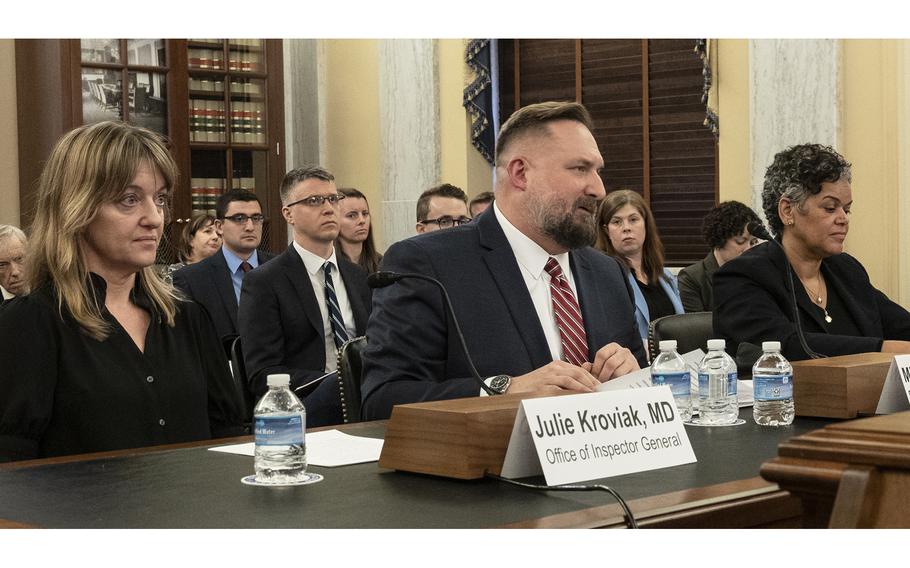
Michael Fisher, chief officer of the Veterans Health Adminstration’s Readjustment Counseling Service, testifies Wednesday, Jan. 31, 2024, at a House Veterans’ Affairs Committee hearing on support for the mental health needs of service members, veterans and their families. At left is Julie Kroviak, principal deputy assistant inspector general in the Office of Healthcare Inspections, and at right is Sharon Silas, director of the Government Accountability Office’s Health Care Team. (Joe Gromelski/Special to Stars and Stripes)
WASHINGTON — Community counseling agencies — known as vet centers — with a mission to help troubled veterans are failing to assess and document suicide risks consistently for clients experiencing post-traumatic stress disorder, depression or military sexual trauma, according to the Department of Veterans Affairs’ Office of Inspector General.
“We repeatedly find evidence of noncompliance with many required processes, most notably those for assessing and documenting a veteran suicide risk,” said Julie Kroviak, principal deputy assistant inspector general in the Office of Healthcare Inspections. “Further our teams are finding repeated failures in oversight of staff training and supervision. These deficiencies can have severe consequences.”
Kroviak testified Wednesday before a Senate Committee on Veterans’ Affairs hearing that focused on the ability of vet centers to meet the mental health needs of veterans and their families. She talked about the findings from several inspections of the centers.
There are 300 community-based vet centers nationwide. Established in 1979 for Vietnam veterans, the vet centers provide mental health counseling to veterans who have served in any conflict area or who have experienced military sexual trauma.
“Veterans have the option to receive confidential mental health services separate from the [Veterans Health Administration] facilities,” said Sen. Jon Tester, D-Mont., the chairman of the committee.
Tester and other lawmakers said vet centers are popular for their accessibility and welcoming atmosphere.
“People can let their hair down and talk to other veterans there,” Tester said.
“Veterans who use our vet centers trust us to improve their quality of life,” said Michael Fisher, chief officer for the VHA’s readjustment counseling service.
But the IG inspections repeatedly found the centers were not in compliance with documenting suicide risks and there was a lack of internal oversight to ensure staff are trained in counseling veterans at risk.
The inspections also found staffing shortages affected the ability to meet demand for counseling, including in the area of helping veterans adjust to civilian life after military service. The centers typically have small teams of four or more staff members that include at least one licensed mental health professional.
“During interviews, we frequently met with leaders in acting positions or leaders assuming multiple roles to compensate for vacancies, which are in part due to the inability to compete with the clinical salaries offered by VA medical centers,” Kroviak said. “This leads to client workload some counselors have described as unsustainable.”
The IG looked at the findings from the vet center inspection program to determine whether staff adequately identify and assist the most high-risk veterans with counseling services and connect them with additional care as needed at Department of Veterans Affairs health facilities.
The inspector general published nine reports covering inspections between September 2021 and May 2023.
Vet centers were cited for lack of documented evidence that counselors performed suicide risk assessments or themselves completed required training for counseling clients who were suicidal or who had experienced military sexual trauma.
Kroviak pointed to a report from the vet center in South Bend, Ind., about “leadership failures that jeopardized the care of several clients deemed high risk for suicide.”
She said the vet center director, who was removed from the post, encouraged staff to “underrate clients’ suicide risks” and failed to train staff on assessing and managing clients’ risks of suicide.
“Considering that vet centers can be the first door a veteran in crisis opens to engage in care, there is no room for careless and incompetent leadership,” Kroviak said.
But Fisher also underscored the central role of vet centers in connecting veterans with people and services in the communities where they reside. Surveys show veterans appreciate the ease of use, responsiveness of staff and efficiency of receiving services.
Sen. Angus King, I-Maine, said the veterans he meets value and use the services.
He recommended financial counseling be added to the services offered at vet centers, as economic hardship often is an identified contributing factor in veteran suicides.
“This strikes me that financial services fits well in the services [vet centers] are providing,” King said. “In my experience, the vet centers in Maine are a high-return, low-cost service. They are a very cost-effective way of serving and meeting the needs of veterans. I know our veterans appreciate it.”
Tester emphasized the appeal of vet centers as a place to get help and talk with other veterans in a casual, non-medical setting.
“One of the things that has always appealed to me about vet centers is the same thing that appeals to me about taking somebody who has PTSD and putting them on a river fishing or riding a horse or doing yoga or any of that stuff. It is more laid back,” he said. “It’s much less structured, much more welcoming and from my perspective, when I’ve visited, the stress level is zero.”